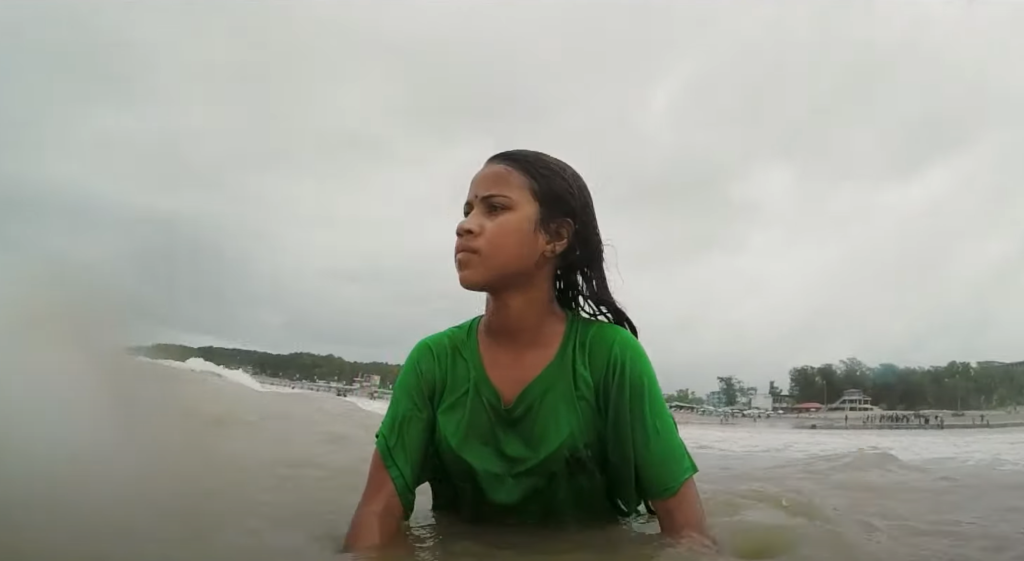Originally scheduled to take place April 30-May 10 in Toronto, Hot Docs Canadian International Film Festival didn’t go as planned this year. The physical version of the fest was cancelled due to COVID-19. Fortunately, the fest is getting a second life. Hot Docs Festival Online will launch May 28, and the lineup includes many of the titles that were slated to screen in Toronto, which boasted a program that was 51 percent women-directed. The fest is geo-blocked to Ontario, Canada. More information about the program and how to tune in can be found here.
Among the titles we’re most looking forward to catching are “The 8th,” an exploration of Irish women’s fight to overturn their country’s restrictive abortion laws, and “Bangla Surf Girls,” the story of three teenage girls who ride the waves in a port city in Bangladesh. Other highlights of the program include “Her Mothers,” a portrait of a lesbian couple who adopt a child, and “Once Upon a Time in Venezuela,” a look at two women who clash over an upcoming election.
Here are some of the docs we’re especially excited about, with plot synopses courtesy of the fest.
“Bangla Surf Girls” – Directed by Elizabeth D. Costa
What it’s about: Three working-class teenage girls in a port city in Bangladesh escape daily hardships and stifling family lives by riding waves on their surfboards and grabbing hold of the fleeting and thrilling sense of freedom that brings.
Why we’re interested: We’re always happy to see movies that shine a spotlight on women athletes, and “Bangla Surf Girls” is a welcome reminder that, contrary to what many pics depict, not all surfer girls are white, blonde, and bikini-clad. Filmed over the course of three years, “Bangla Surf Girls” pays tribute to teens fighting to overcome the odds and immense poverty to achieve their dreams, despite judgement from their community. Though they make their living selling trinkets on the beach, participating in a local surf club makes the girls realize their passion is surfing — and riding the waves is where they feel free and powerful.
“I would like people to know that a small local program can make such a big difference in the lives of these girls. They have an opportunity to change their destiny and it’s a huge message for girls in similar situations in any part of the world,” director Elizabeth D. Costa told us in a soon-to-be-published interview. “Don’t give up and accept your fate. You have the power to change your future.”
It’s been 18 years since “Blue Crush” was released, and we’re eager to see a new generation of inspiring surfer girls riding giants.
“Shut Up Sona” – Directed by Deepti Gupta

“Shut Up Sona”: Hot Docs
What it’s about: Singer, performer, and self-styled “troublemaker” Sona Mohapatra channels the goddess energy of Chandi as she fights for equal rights as an empowered, modern Indian woman in a society and music industry denying her value.
Why we’re interested: Shot over three years, Deepti Gupta’s first feature follows musical artist Sona Mohapatra’s career, her evolving relationship with the music industry, and her role as a leader of India’s #MeToo movement. Mohapatra herself is a survivor; she has accused Bollywood composer Anu Malik and singer Kailash Kher of sexual misconduct. But this doc’s main draw is Mohapatra’s tenacity. As the tongue-in-cheek title suggests, she is not shutting up and she is not afraid to fight for equality and respect in her country or her profession.
“For me she is one of the most inspiring people today because she speaks her mind about everything,” Gupta has said of Mohapatra. “Every now and then she is told by people to just sing songs and not talk about other issues. She is trolled all the time for what she says, but she is fearless, she is unapologetic.” For this and many other reasons, she’s a star.
“Breaking the Silence” – Written and Directed by Priscila Padilla
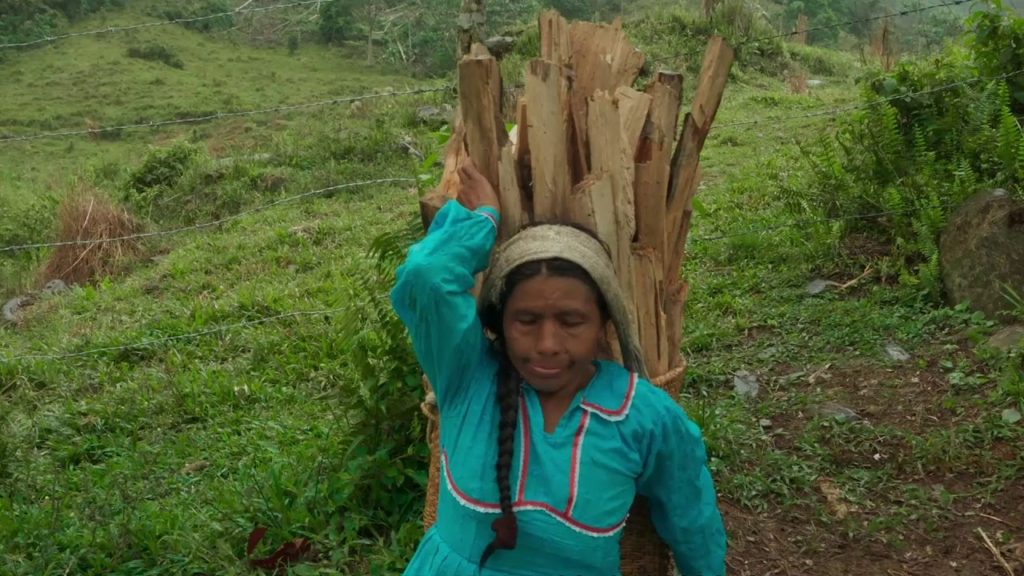
“Breaking the Silence”: Hot Docs
What it’s about: An Indigenous woman leaves her Emberá Chamí community for Bogotá as she grapples with her experience of female genital mutilation. Joining forces with a new friend, they return to engage with other Indigenous women about the tradition and enact change.
Why we’re interested: Stories of female genital mutilation (FGM) and the movement to end it are often told from a Western perspective. Well-intentioned outsiders share reports of the practice, focusing on its violence and misogynist roots without really consulting or deferring to the survivors themselves. In other words, FGM survivors are often left out of their own stories. It seems “Breaking the Silence,” fittingly, breaks with this tradition.
Priscila Padilla’s doc isn’t just about FGM, it’s about Luz, a woman who has experienced the practice and is struggling to reconcile with it and the history of colonialism that haunts Colombia. “Breaking the Silence” is a specific account of FGM, Colombia’s different communities, and our connections to our bodies and our land. Luz is the only one who can do justice to her story, and, critically, with this film, she’s the one who does.
“The 8th” – Directed by Maeve O’Boyle, Lucy Kennedy, and Aideen Kane
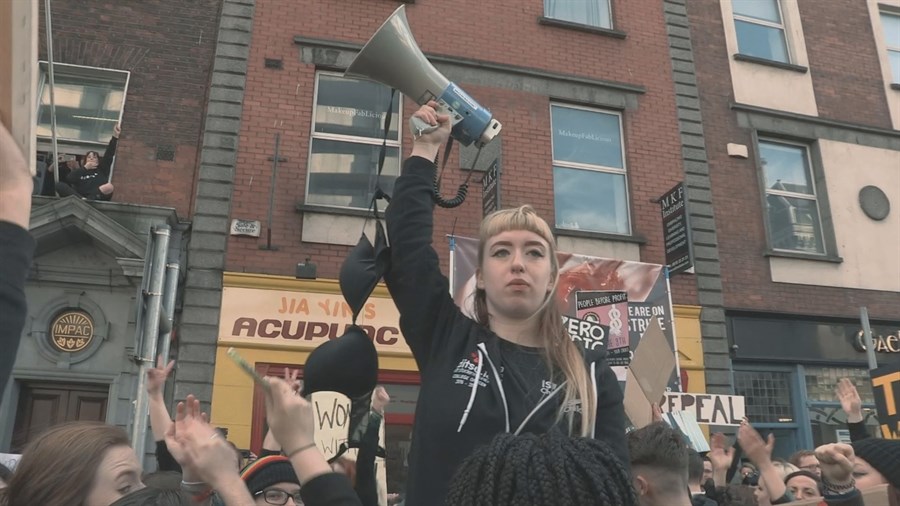
“The 8th”
What it’s about: “The 8th” tells the story of Irish women and their fight to overturn one of the most restrictive laws on abortion in the world. After a 35-year struggle the pro-choice side have to radically shift tactics to try and bring this historically conservative electorate over the line.
Why we’re interested: The fight for reproductive rights remains an uphill battle. Even in corners of the world where women are supposed to be guaranteed the legal right to choose, financial and geographical barriers make it difficult — and sometimes impossible — for women to exercise their rights and access safe abortions. And that’s to say nothing of the countries where abortion remains illegal. “The 8th” tells the story of how a group of women paved the way to change Ireland’s abortion laws, and that story is told by Irish directors.
“We grew up in Ireland under the shadow of the 8th Amendment. We witnessed its impact on women’s lives — most notably the X case — a 14 year old rape victim who was refused permission to leave the country for an abortion and the death of Savita Halappanaver [who died after she was denied her request for an abortion following an incomplete miscarriage],” Maeve O’Boyle, Lucy Kennedy, and Aideen Kane told us in a soon-to-be-published interview. “When the government called a referendum to repeal the 8th amendment, we knew this was one of the most important stories of our generation. Our goal was to document this defining moment in the context of Ireland’s historic treatment of women.” It’s critically important for this chapter of the country’s history to be recorded, and all the more so by a trio of Irish women.
“For the Love of Rutland” – Directed by Jennifer Maytorena Taylor
What it’s about: A recovering opioid addict and mother, Stacie barely gets by in her hardscrabble, job-scarce Vermont town. When Syrian refugees arrive, racism and xenophobia turn her community into a flashpoint of Trump’s America and Stacie into the unlikeliest of heroes.
Why we’re interested: American small towns and rural communities — not altogether unfairly — have the reputation of holding the country back in terms of social issues. (Or they’re the places that make America great again, depending on your worldview.) So it’ll be refreshing to see a film like “For the Love of Rutland.” Protagonist Stacie and her fellow Rutland, Vermont, residents are disenfranchised and struggling — something they share in common with Syrian refugees who arrive in town. Many of the townies succumb to their base tribalist instincts and aim all their ire at the refugees instead of the system that was designed to keep them poor and powerless. But Stacie doesn’t.
As racism and xenophobia runs rampant in the United States’ small towns, suburbs, and cities alike, “For the Love of Rutland” reminds us that empathy still exists. People are capable of it, when we’re willing to try.
“Her Mothers” – Directed by Asia Dér and Sári Haragonics
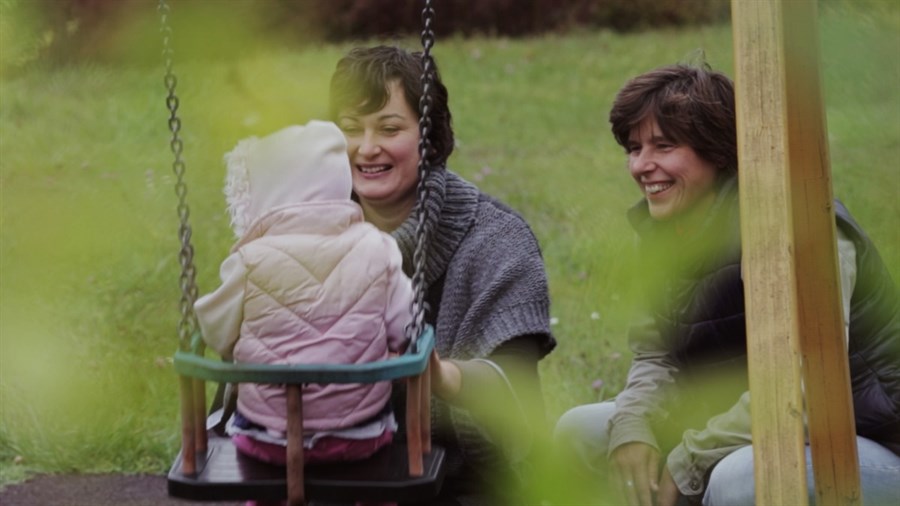
“Her Mothers”: Hot Docs
What it’s about: In this intimate tale of love and freedom, a lesbian couple contends with homophobia in an increasingly radicalized Hungary as they struggle to create a family through adoption and to define their roles in motherhood.
Why we’re interested: The couple at the center of “Her Mothers,” Virág and Nóra, told the doc’s directors that “most of the rainbow families leave Hungary the moment their adoptions come through because of the hostile atmosphere.” They opted to stay.
In addition to exploring how the country they live in shapes their experiences as same-sex parents, the film also depicts the difficulties in Virág and Nóra’s relationship and their adjustment to parenthood. Directors Asia Dér and Sári Haragonics were adamant that “Her Mothers” not show “just the happy moments. Just because these are two women, life isn’t different,” Dér told us in an upcoming interview. Haragonics emphasized that they wanted to show “how similar” the rainbow couple’s “struggles and happy moments are in comparison to a heterosexual couple.”
Same-sex couples are often held up to unrealistic — and unfair — standards. Couples bicker. Partners can have difficulty adjusting to life as parents. That’s just life. We appreciate that “Her Mothers” isn’t trying to present an idealized version of Virág and Nóra’s relationship, as if to prove the worthiness of their love or abilities as parents. There’s no misguided attempt to legitimize their relationship or their status as Parents of the Year by showing only the highlights of their lives. We appreciate seeing both the highs and the lows — and a same-sex couple that can just be instead of being forced to prove themselves.
“The School of Housewives” – Directed by Stefanía Thors
What it’s about: The Reykjavík School of Housewives has taught cooking, cleaning, and home economics since 1942. But ushering the domestic crafts of the past into the future — along with values of efficiency and conservation — requires a re-evaluation of gender roles and respect.
Why we’re interested: It’s a mistake to write off home economics entirely. Widely dismissed as sexist, retrograde nonsense designed to prepare girls to cook, clean, and all-around cater to their husbands, home economics has the potential to be so much more — especially in a world battling climate change. As “School of Housewives” director Stefanía Thors told us, she hopes the film will encourage audiences to “respect old traditions and cherish self sufficiency. Know how to take care of your family using local resources — one day it might save you and maybe the whole planet.”
The doc tells the story of a school in Reykjavík formerly known as The School of Housewives, an educational institution designed to teach students how to knit and make their own clothes, prepare traditional Icelandic food, and more. It’s since been rebranded as The Home Economy School, and now welcomes men as students.
As the recent spate of bread-baking and gardening in the wake of COVID-19 has demonstrated, many folks are willing and able to adopt more sustainable methods of preparing and eating food when they have the time, resources, and knowledge to do so.
It sounds as though “The School of Housewives” will offer an important reminder that these life skills don’t have to be — and shouldn’t be — gendered, and everyone can benefit from embracing different ways to create and consume.
“Love & Stuff” – Directed by Judith Helfand
What it’s about: While mourning the relatively recent loss of her own mother, filmmaker Judith Helfand prepares to become a “new old” mom at 50 in this exploration of the transformative power of parenting and our complex attachment to the past.
Why we’re interested: Tackling single parenthood via adoption is not a story we see often on-screen — and in this case, the mother-to-be is a 50-year-old. Director Judith Helfand is pulling double duty as the subject of the doc. We’re keen to see how she chooses to tell her own story, which is also a meditation on grief about the loss of her own mother as she’s preparing to become a mother herself.
“I want to help people reconsider the existential problem we all share: time,” Helfand told us in a soon-to-be-published interview. “I am half a century older than my daughter, and I think about this often. Just like I do in the movie, I often find myself thinking in multiples of ten. When she is six I will be 56. When she has her bat Mitzvah I will 63. When she is 20 I’ll be 70. When she is 40 I’ll be 90,” she explained. Ultimately, since “the present is all anyone has,” the filmmaker wants to reflect on the question of “how [we can] value the time right here and right now, instead of worrying about the future,” an especially relevant goal in the throes of COVID-19.
Helfand explained, “I want ‘Love & Stuff’ to inspire people to spend mindful quality time with the people who matter to them most — especially now during this pandemic, when people are alone together on Zoom, Facetime. and Skype. It’s hard to talk about end of life,” she acknowledged, “it’s easier to talk about stuff. I know you can do both and along the way attach meaningful stories to stuff you have grown up with but just never asked about.”
“Finding Sally” – Written and Directed by Tamara Dawit
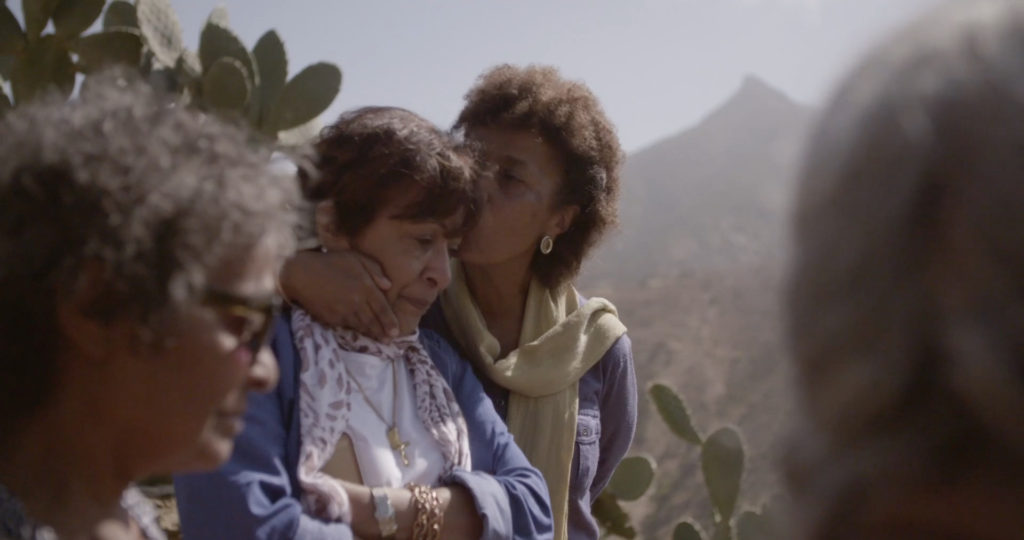
“Finding Sally”
What it’s about: The remarkable story of the director’s aunt, who at 23 was an idealistic aristocrat-turned-communist-rebel with the Ethiopian People’s Revolutionary Party. After landing on the most-wanted list, she mysteriously disappears underground during the revolution’s tumultuous aftermath.
Why we’re interested: Tamara Dawit didn’t know about her aunt Sally when she was growing up. Her discovery of this mysterious family member was the catalyst for this documentary, as the filmmaker revealed in an upcoming interview with Women and Hollywood.
Dawit’s aunt also serves as a personal connection to the filmmaker’s passion for Ethiopian history, “specifically the activism and ideology of the student movement in the 1960s/’70s.” Dawit explained, “I’ve also been drawn to telling stories about Ethiopian women and when you read about that period in Ethiopian history you don’t hear much about women or their role,” she said. “So, it wasn’t until I found out about Sally and her role as an activist in the 1970s in Ethiopia that I really started to think about making a film about the revolution and the Red Terror that followed. With that in mind I was also very specific and focused on only including Ethiopian women as characters and voices in the film.”
Historical narratives concerning Africa and women are still too few and far between. An account of both, “Finding Sally” will hopefully place Sally and other women like her back in the history books.
“Once Upon a Time in Venezuela” – Directed by Anabel Rodríguez Ríos
What it’s about: In Venezuela, corruption, pollution, and political decay take their toll as the small fishing village of Congo Mirador is literally sinking from sedimentation. Confronting the crisis, two local women clash over the upcoming election, eyeing different paths forward.
Why we’re interested: In the past few years, there’s been an upswell of doc projects following women activists and political candidates, including Rachel Lears’ “Knock Down the House,” Hannah Rosenzweig and Wendy Sachs’ “Surge,” and Grace Lee and Marjan Safinia’s “And She Could Be Next.” For the most part, the women of those stories are on the same page, ideologically speaking. “Once Upon a Time in Venezuela” shows us something different. As the parliamentary elections loom, protagonists Tamara and Natalie are pulling for very different outcomes. The former is a businesswoman and Chavist party representative; the latter is a teacher supporting the opposition.
We see plenty of men of differing political persuasions duke it out on-screen — there have been many political fights between women and men featured, too. But “Once Upon a Time in Venezuela” underlines something we all know is true, but is rarely acknowledged in culture: women are not a monolith. We have a range of opinions, experiences, perspectives, and motivations — and, yes, that means we disagree with one another from time to time. We’re psyched for Anabel Rodríguez Ríos’ first feature as a solo director because it’s aware of that — and not afraid to embrace it.
“Always Amber” – Directed by Hannah Reinikainen and Lia Hietala
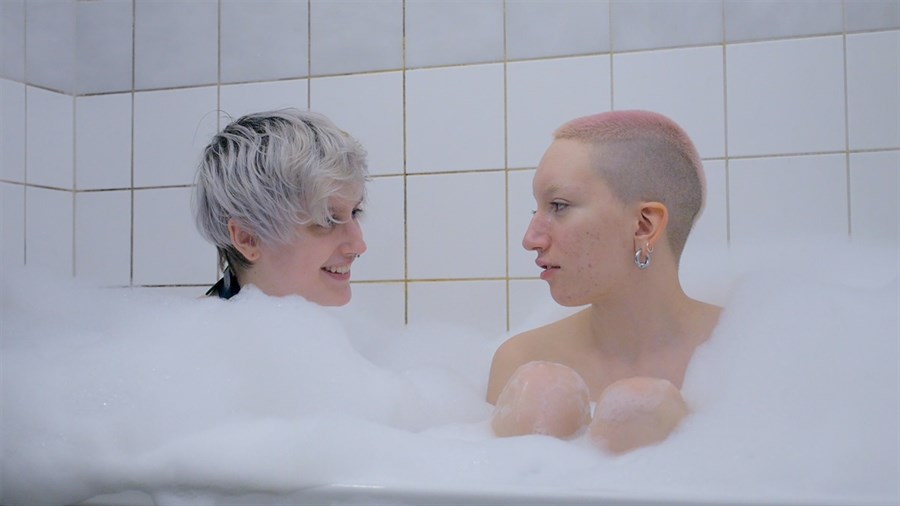
“Always Amber”: Hot Docs
What it’s about: Teenage besties Amber and Sebastian are inseparable, exploring gender, queerness, and rainbow hair colors together until a love triangle upends everything. Now transitioning solo, Amber comes of age with an inspiring confidence unique to a new generation.
Why we’re interested: Friendship drama, inconvenient crushes, experimentation with new looks — “Always Amber” tackles a lot of adolescent tropes. However, its focus on a young nonbinary protagonist and the multiple ways gender and sexuality can manifest themselves makes the well-trod coming-of-age journey feel new again.
Shot over three years, Hannah Reinikainen and Lia Hietala’s doc promises to be a prime example of what on-screen inclusion can be: both familiar and revelatory, universal and unique. Amber’s story is their own, but we’ve all definitely experienced aspects of it.
“Lessons of Love” – Directed by Malgorzata Goliszewska and Kasia Mateja
What it’s about: After escaping from an abusive marriage of 45 years, a free-spirited Polish woman rediscovers friendship and love. But can her personal reinvention coexist with the conservative attitudes of her generation?
Why we’re interested: “Lessons of Love” sees 65-year-old Jola returning to her home country, Poland, after leaving her abusive, alcoholic husband behind at their house in Italy. We’re eager to see Jola reconnecting with old friends and redefining who she is — and what kind of life she wants — in her ex’s absence. Nuanced portraits of domestic abuse remain rare, as do films about women over 60. “Lessons of Love” will serve as a reminder that, contrary to what Hollywood execs seem to believe, women don’t cease to be interesting once they age out of playing ingenues. In her sixth decade, Jola is still reinventing herself — and we can’t wait to see who she is when she emerges.
“I Want You If You Dare” – Written and Directed by Dagmar Smržová
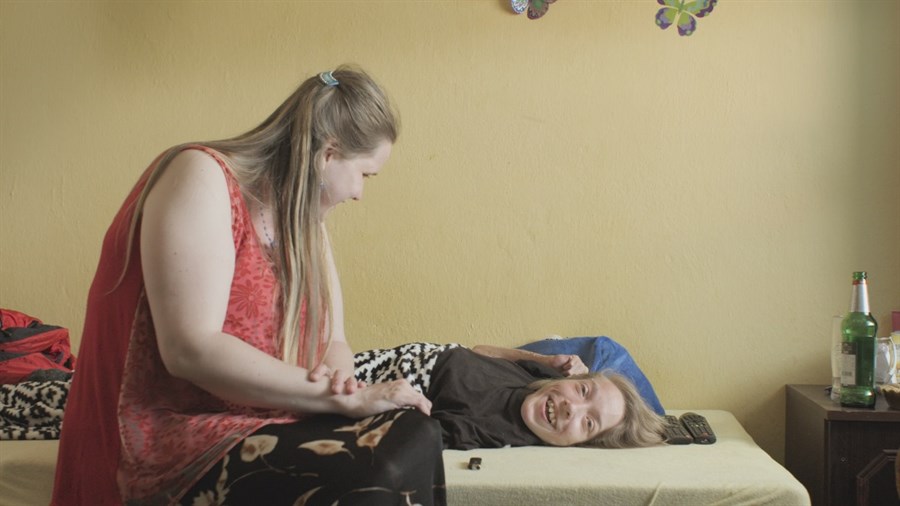
“I Want You If You Dare”: Hot Docs
What it’s about: In this unsentimental and refreshing look at disability, a young woman immobilized by cerebral palsy longs for independence and her first sexual encounter while her brash mother drafts a personal ad to help her along her way.
Why we’re interested: Similar to this year’s “Crip Camp,” “I Want You If You Dare” spotlights disabled persons in all their complexity. Dagmar Smržová’s latest stresses that disability and sexuality are not mutually exclusive. Protagonist Jana is immobile due to cerebral palsy, but is determined to have her first sexual experience. She also wants to move out of her mother’s house and into an assisted-living facility. Her mom, Martina, is fine with the former, even enthusiastic, but not so sure about the latter.
In the very few films out there featuring folks living with disabilities, said characters are often portrayed as asexual and helpless. Their caregivers are also frequently shown as worrying, silently suffering martyrs. “I Want You If You Dare” challenges both of these ideas without fanfare, telling an honest coming-of-age tale about both women. Jana’s story is about moving forward, and Martina’s letting go.
“9/11 Kids” – Directed by Elizabeth St. Philip
What it’s about: Sixteen schoolchildren were in the room with President Bush when he was informed about the September 11th terrorist attacks. Now in their mid-20s, learn how their lives have unfolded in this fascinating look at race, politics, and the post-9/11 American Dream.
Why we’re interested: As director Elizabeth St. Philip told us, every aspect of that world-changing day has been analyzed and dissected, “but the kids were forgotten” and reduced to “a footnote in history.” With “9/11 Kids,” Philip wanted “to give them a voice for the first time. Also the fact they were African American and Latinx really resonated with me,” she explained. “I’m drawn to stories about people of color who are on the margins but have big dreams and determination to succeed.”
We love the concept of “9/11 Kids” and are curious to see how being in the room with President Bush on that fateful day shaped the characters’ perception of the terrorist attacks — and how the aftermath of September 11, namely the political climate and policy changes that ensued, impacted them through the years.
“Mother-Child” – Directed by Andrea Testa; Written by Andrea Testa and Francisco Márquez

“Mother-Child”: Hot Docs
What it’s about: At a public hospital in Argentina — where abortion is still mostly illegal — vulnerable teenage girls confide in caring professionals, revealing the weightiness of their decisions and the fragility of their dreams.
Why we’re interested: In Argentina, abortion is illegal, except in cases of rape or when the mother’s health is endangered. Because of the nation’s strict anti-choice policies, it’s estimated that a girl under the age of 15 is forced to give birth every three hours. Andrea Testa’s latest documentary introduces us to some of the victims of Argentina’s reproductive healthcare rules: a rape survivor hoping to terminate her pregnancy; a patient who suffers a hemorrhage after attempting a medical abortion; and a young woman whose delivery is complicated by injuries sustained by domestic abuse. These women must bear the weight and consequences of Argentina’s anti-abortion laws; their lives and wellbeing are threatened, and their decisions are being made for them.
Currently, certain activists and politicians are pushing to legalize abortion in Argentina. Let’s hope they and their opponents — not to mention the United States, and other places enacting and enforcing anti-choice legislation — see “Mother-Child” and realize just how much is at stake.
